NO-INJURY LAWSUITS BOG DOWN STATE ECONOMY, DRIVE BUSINESS OUT OF STATE
California Supreme Court Ignores U.S. Supreme Court, Expands Liability Under ‘Private Attorney General Act’
Enacted in 2004, California’s Private Attorneys General Act (PAGA) has become known as the “Sue Your Boss” law. While its initial purpose was to protect workers, it has done little to help them. The plaintiffs’ bar has been the true beneficiary.
PAGA authorizes “aggrieved” employees to file lawsuits seeking civil penalties on behalf of themselves, other employees, and the State of California for labor code violations. Many PAGA lawsuits revolve around technical nitpicks, such as an employer’s failure to print its address on employees’ pay stubs, even though the address was printed on the paychecks themselves.
Three quarters of the penalties paid by non-compliant employers go to the state’s Labor and Workforce Development Agency while only 25 percent go to the “aggrieved employees” and their lawyers who take a third or so of that. In some cases, the plaintiffs’ lawyers receive even more.
Standing in PAGA Claims
In June 2022, the U.S. Supreme Court issued a decision in Viking River Cruises v. Moriana that many hoped would impact California plaintiffs’ lawyers’ ability to circumvent arbitration agreements.
The U.S. Supreme Court held that the Federal Arbitration Act (FAA) prohibits California courts from not enforcing employment arbitration agreements as it violates each litigant’s right to agree to resolve disputes without litigation. Therefore, the Court ruled that a dispute between a plaintiff and Viking Cruises should be decided through arbitration, as provided by the agreement, and the representative claims (those the plaintiff brought on behalf of other people) should be dismissed, as the plaintiff no longer has standing to bring them.
As a result of the U.S. Supreme Court’s ruling, the California Supreme Court agreed to hear Adolph v. Uber, recognizing that the lower court’s decision may conflict with the Viking Cruises decision. In Adolph, an Uber driver sued the company in state court, alleging Uber misclassified him as an independent contractor. Despite signing an arbitration clause in his employment contract with Uber, he sought statutory damages under PAGA in court. Uber filed a motion to compel arbitration of the individual claim and dismiss the representative claims. Nevertheless, both the trial court and appellate court denied the motion and allowed both the individual and representative claims to move forward.
In July 2023, the California Supreme Court strayed from the Viking decision and held that representational PAGA claims can stay in court even when individual claims are sent to arbitration. According to the Court, “an order compelling arbitration of the individual claims does not strip the plaintiff of standing as an aggrieved employee to litigate claims on behalf of other employees under PAGA.”
Several cases involving arbitration clauses were pending as California courts awaited this decision. Adolph opened the floodgates for these PAGA claims, and others, to proceed in the trial courts.
Manageability of PAGA Claims
The California Supreme Court is reviewing whether PAGA suits can proceed when discovery is “unman- ageable.” The California Fifth District Court of Appeal held that manageability is only a requirement for class actions, not PAGA claims. Allowing “unmanageable” PAGA cases to proceed would unfairly burden defendants and lead to inefficiencies and significant pressure to settle cases because of the overwhelming discovery that plaintiffs would seek.
‘Food Court’
California regained its status as the plaintiffs’ bar’s favorite food court. It beat out New York for the most “no-injury” consumer class action filings targeting the food and beverage industry. About one third of the nation’s lawsuits taking issue with food labeling – 70 of 214 – were filed in California.
These lawsuits often claim that some aspect of a product’s packaging or marketing misleads consumers, even though it is unlikely to have made a difference in anyone’s decision to buy a product.
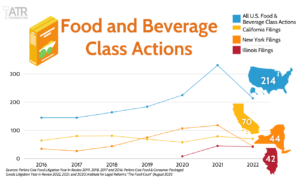
Trial Lawyers’ Newest Statutory Gold Mine
On January 1, 2023, the California Privacy Rights Act of 2020 (CPRA) went into effect. This Act replaced the California Consumer Privacy Act (CCPA) and addressed some of the CCPA’s ambiguities. It eliminates a business’ 30-day window to cure, grants new rights to consumers, and increases business’s contractual obligations. It also creates the California Privacy Protection Agency to enforce the CPRA, which will fine businesses $2,500 for violations and $7,500 for intentional violations and those involving a minor. While the Act took effect in 2023, it applies to data collected beginning on January 1, 2022.
In July, California Attorney General Rob Banta announced that his office was doing an “investigative sweep” of all large employers in the state to ensure they are in compliance with the Act.
Apart from the attorney general investigations, consumers can sue for cash awards following a data breach without proving an actual injury, making it easy for trial lawyers to bring massive class actions. The law also provides for treble damages and attorneys’ fees, creating a large incentive for the plaintiffs’ bar to file lawsuits.
Americans with Disabilities Act Lawsuit Abuse
In 2022, California was home to nearly one third of the nation’s ADA accessibility litigation. That year, plaintiffs’ attorneys filed 2,519 accessibility lawsuits in California – the state was second to only New York, a fellow Judicial Hellhole®. These are federal lawsuits claiming that businesses violated standards under the ADA that are intended to ensure that public places are accessible to everyone but have been abused by serial plaintiffs and certain attorneys.
In California, penalties for accessibility violations are much higher due to the state’s Unruh Civil Rights Act, which provides for a fine of $4,000 per violation, a fine other states do not have, plus attorneys’ fees. Often these so-called “violations” are as minor as a mirror that is an inch too high or a sidewalk or parking lot that is angled one degree too much.
In the first half of 2023, there were 1,020 ADA lawsuits filed in California federal courts. This represents a 35.8% decline from the 1,587 lawsuits filed in the first half of 2022. However, California still had the second-highest number of federal ADA filings among other states.
California’s dip in filings may in part be attributed to less filings by Potter Handy LLP and the Center for Disability Access. As a result of their lawsuit abuse, these entities were hit with actions by the San Francisco and Los Angeles District Attorneys.
 The Potter Handy law firm set up the Center for Disability Access (CDA) and filed thousands of lawsuits on behalf of just a handful of plaintiffs over the past few years. For example, CDA worked with a quadriplegic plaintiff to file over 4,000 ADA claims in California from 2010 to 2021, which amounts to roughly 1 lawsuit per day for 11 straight years. The plaintiff filed over 1,000 claims in 2021 alone, forcing businesses, already struggling to recover from the pandemic, to close for good. A federal grand jury indicted the plaintiff for tax fraud in 2019 after failing to pay taxes on his lawsuit income.
The Potter Handy law firm set up the Center for Disability Access (CDA) and filed thousands of lawsuits on behalf of just a handful of plaintiffs over the past few years. For example, CDA worked with a quadriplegic plaintiff to file over 4,000 ADA claims in California from 2010 to 2021, which amounts to roughly 1 lawsuit per day for 11 straight years. The plaintiff filed over 1,000 claims in 2021 alone, forcing businesses, already struggling to recover from the pandemic, to close for good. A federal grand jury indicted the plaintiff for tax fraud in 2019 after failing to pay taxes on his lawsuit income.
CDA filed 560 ADA claims on behalf of another plaintiff in 2021, bringing his grand total to over 1,700 claims filed. In one suit, federal Judge Vince Chhabria (Northern District) levied a $35,000 sanction against CDA for conspiring to falsify pleadings. “You may not lie in an effort to keep your lawsuit alive. And that is the real problem here,” said Judge Chhabria in his sanction order.
In April 2022, the San Francisco and Los Angeles district attorneys filed a joint suit against Potter Handy for “unlawfully circumventing” California state procedural requirements by “filing thousands of boilerplate, cut-and-paste federal court lawsuits that falsely assert its clients have standing under the [ADA].” The DAs’ action alleged that the sheer number of claims made it “literally impossible for the Serial Filers to have personally encountered each listed barrier, let alone intend to return to hundreds of businesses located hundreds of miles away from their homes.”
The DAs’ action further alleged that these ADA shakedown lawsuits have extracted tens of millions of dollars from California businesses.
Plaintiffs demand between $10,000 and $20,000 to settle, and most businesses have no choice but to pay because litigating a case can cost
$50,000 or more even if the business wins. The opportunistic plaintiffs’ lawyers target mom-and-pop shops with little financial resources, especially owners who speak English as a second language. The lawsuit demanded that CDA return all settlement money to California business owners.
Unfortunately, in August 2022, San Francisco Superior Court Judge Curtis Karnow dismissed the lawsuit. He found that Potter Handy’s filings were covered under the state’s “litigation privilege.” This bars a third-party litigant from using client communications and lawsuit filings as evidence against the firm. The judge found the privilege applies “irrespective of the communication’s maliciousness or untruthfulness.”
The cities appealed the dismissal in October 2022. The Los Angeles DA dubbed the appeal “the best course of action” to guard against more “frivolous boilerplate lawsuits.” Meanwhile, the San Francisco DA said she was appealing “to protect business from predatory law firms that are abusing disability protections by filing these fraudulent lawsuits.” The case is currently pending in the California Court of Appeals for the First District.
Ninth Circuit Decision Emboldens Serial Plaintiffs
In January 2023, the Ninth Circuit issued a disappointing decision that prevents courts from taking the “litigiousness of the plaintiff into consideration.” Here, the plaintiff, Chris Langer, is a paraplegic, serial litigant represented by the Center for Disability Access. He filed a complaint against owners of a lobster shop and smoke shop for lack of accessible parking. This was just one of nearly 2,000 ADA lawsuits that he has filed over the past 30 years.
The district court found Langer’s testimony to be unreliable based on the fact that he was a serial plaintiff and found that he had no intention of returning to or patronizing the establishment. According to District Judge Robert Benitez, “On the day he filed this lawsuit, he also filed six other lawsuits. Yet, [Langer] was unfamiliar with those suits as well as the businesses involved.”
Unfortunately, the Ninth Circuit reversed the district court’s decision, holding that a plaintiff’s motive for visiting a place of public accommodation is irrelevant to standing. District courts are not allowed to “question the ‘legitimacy’ of an ADA plaintiff’s intent to return to a place of public accommodation simply because the plaintiff is an ADA tester or serial litigant.”
The dissent said the majority ignored its “’significantly deferential’ standard of review” and observed it was “implausible to think that Langer intended to actually patronize the nearly 2,000 businesses that he had sued.”
In February, the shop owners filed a petition to rehear the case. The petition was deferred pending the U.S. Supreme Court’s decision in Acheson Hotels v. Laufer, which raises the issue of when a person may sue as a “tester” under the ADA.
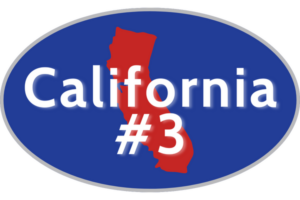 The “Golden State” is the plaintiffs’ bar’s laboratory for finding innovative new ways to expand liability through both the courts and legislature. These novel theories of liability are burdening small businesses and bogging down the state’s economy. Even in areas where the U.S. Supreme Court has stepped in to rein in lawsuit abuse, the California Supreme Court has disregarded precedent and expanded liability.
The “Golden State” is the plaintiffs’ bar’s laboratory for finding innovative new ways to expand liability through both the courts and legislature. These novel theories of liability are burdening small businesses and bogging down the state’s economy. Even in areas where the U.S. Supreme Court has stepped in to rein in lawsuit abuse, the California Supreme Court has disregarded precedent and expanded liability.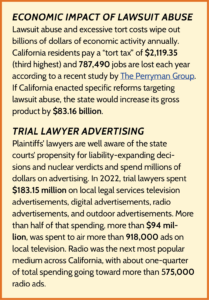 Private Attorneys General Act (PAGA) litigation, to serial plaintiffs filing hundreds of lawsuits under the Americans with Disabilities Act, the list of issues with the state’s civil justice system is endless. Rather than address the abuses and improve the litigation climate, state leaders seem to embrace the Judicial Hellholes® moniker.
Private Attorneys General Act (PAGA) litigation, to serial plaintiffs filing hundreds of lawsuits under the Americans with Disabilities Act, the list of issues with the state’s civil justice system is endless. Rather than address the abuses and improve the litigation climate, state leaders seem to embrace the Judicial Hellholes® moniker.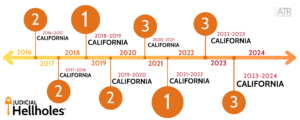



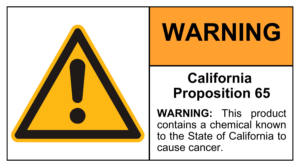 Proposition 65
Proposition 65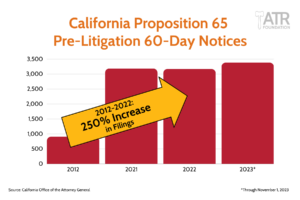

 given rise to thousands of baseless personal injury claims against Roundup®. These cases have had mixed results with Monsanto
given rise to thousands of baseless personal injury claims against Roundup®. These cases have had mixed results with Monsanto 
 The
The  Lawsuit abuse under California’s
Lawsuit abuse under California’s  The California Supreme Court is deciding whether unfair and unconscionable provisions in an arbitration agreement are severable or if the entire agreement is void. In
The California Supreme Court is deciding whether unfair and unconscionable provisions in an arbitration agreement are severable or if the entire agreement is void. In  Los Angeles asbestos lawsuit filings have
Los Angeles asbestos lawsuit filings have  An effort is underway in California to attack companies that tout their environmental sustainability efforts with lawsuits.
An effort is underway in California to attack companies that tout their environmental sustainability efforts with lawsuits.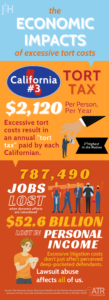 addressed in another context, namely, the gig economy. In November 2020, California voters
addressed in another context, namely, the gig economy. In November 2020, California voters 

